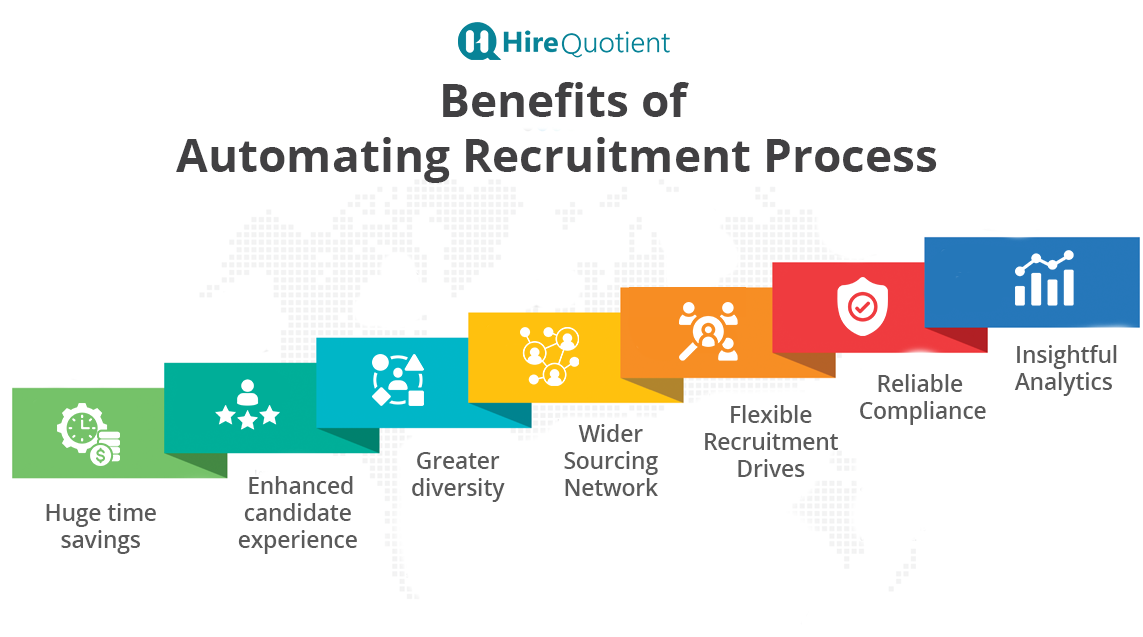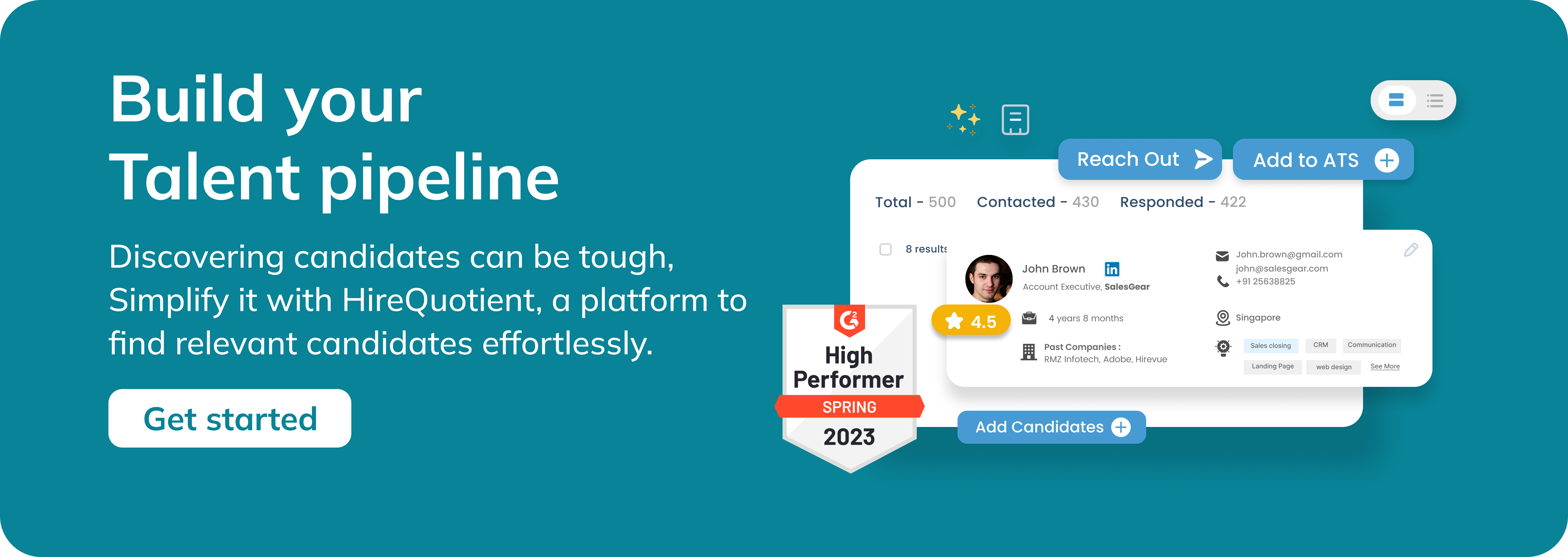How recruitment automation can help you hire better?
Published on November 3rd, 2022
Imagine you have a secretary. He goes through the endless resumes, shortlists the best candidates, schedules interviews and even checks the background of the candidates.
No you’re not dreaming! This is reality except not in the form of your secretary but artificial intelligence.
AI enabled hiring tools have automated the process of recruitment that can take away all your hiring troubles and save you ample time to focus on more challenging tasks.
But first, what is recruitment automation?
Recruitment Automation - What does it entail?
The term recruitment automation sounds self-explanatory. However, anyone that has ever managed a hiring process knows how manual and difficult recruiting can be.
Recruitment automation refers to using software to automate and streamline your recruiting processes. The goal of using this software is to reduce manual tasks that can be done more efficiently by technology, free up recruiters’ time, and empower them with data that facilitates well-informed hiring decisions.
75% of recruiters say technology will play a larger role in their hiring process this year—and we can expect that 100% of recruitment departments will rely on automation to streamline hiring processes sooner rather than later.
What are the recruitment tasks that can be automated?
1. Application Tracking System
A huge part of a successful enterprise is staying organized internally. Candidates don’t want to have to berate you for additional information or be confused with another candidate. An applicant tracking system is a commonly used recruitment automation tool to store candidate information, interviewer notes and automate communication based on their stage in the hiring process.
2. Pre-employment Assessments
The pre-employment assessment test is another area where automation can make a significant contribution. Automated pre-employment tests can provide an objective assessment of a candidate's qualifications based on predetermined criteria and generate a detailed report on their suitability for the role. This information can then be used to streamline the selection process and help you identify the candidates with the highest potential for success.
There are various types of pre-employment assessments that can help you assess a candidate's fit for the job. Some examples include personality tests and logical reasoning tests. Most pre-employment assessment platforms combine different assessments into one online experience to create a robust and personalized evaluation that caters to the organization's specific needs.
3. Candidate Nurturing
There are top talents around, but they may not be ready to work for your organization. To keep them warm, recruiters rely on recruitment automation tools to automate emails and other communication features to teach applicants about a particular company and why they should work there.
4. Gather Feedback from Hiring Managers
Gathering feedback from each and everyone that are involved in the process of recruiting is very tiring. When you have a system that allows you to automate the collections of feedback in place, then your work can be made easier.
With recruitment automation tools, you can follow up on every interview and you can automatically send emails to interviewers asking them to submit their interview feedback.
These tools also have reminder features so that you can remember all tasks on your busy schedules and you won’t forget to follow up with candidates. When you use these recruitment automation tools, you can reduce the time spent trying to remember the tasks to be carried out and spend more time focusing on the tasks that will bring you top talents.
5. AI Video Interviews
Video interviews have been available for a very long time. However, with artificial intelligence powered recruitment automation tools, video interviews have been transformed. These tools can recognise and access facial expressions, speech patterns, and word choice.
The video interview feature in AI-powered recruitment automation tools will give recruiters greater insight into the overall fit of an applicant. You can use such recruitment automation tools to supplement your current hiring practices instead of making it the main determinant for your hiring decision-making process.
Also, these tools can detect nuances that you might not notice right off the bat– however, you should also give room for errors because AI tools do not have the ability to read minds and lack the ability to adequately determine a candidate’s quality. Humans will always be required during recruitment processes, so do not view recruitment automation tools as a replacement for recruiters.
6. Onboarding
An effective onboarding process is crucial for the success of the organization. Employees who go through a smooth onboarding process are more likely to feel welcomed and valued by the company, which in turn increases engagement and productivity. This proved to be true in a US HCM research and analyst firm study, which found that organizations with an effective onboarding process enhance new employee retention by 82% and productivity by over 70%.
Despite this, only 12% of employees agree that their organization does an excellent job onboarding. This could be attributed to the fact that many companies still rely on manual and document-heavy processes to manage onboarding.
Adopting an automated onboarding solution can simplify the process and make it more efficient for both managers and new hires. The technology fosters self-serve support by making manuals, guides, and documentation readily available on the employee portal. It can also automate routine tasks, such as sending welcome emails and setting up meetings with managers, saving both time and human resources.
Benefits of Automating Recruitment Process

As an HR professional or a recruiter, you always have more that could be done and areas that could be improved, no matter how hard you have worked. Unfortunately, HR professionals are asked to do more with shrinking resources and growing expectations. This is where recruitment automation comes in. recruiters can make a major improvement in their daily tasks by automating some time consuming and redundant tasks.
1. Huge time savings
The most obvious benefit of automated recruiting software is the time recruiters save by automating parts of their process. The average recruiter spends anywhere from 40 to 60 percent of their workday searching for new candidates.
By automating the sourcing and initial screening processes, recruiters gain 3 to 5 hours back each day that can be spent engaging with candidates, interviewing applicants, and performing other tasks that require human intelligence.
Don’t we all wish there were more hours in a day? Automated recruiting software grants recruiters this wish.
2. Enhanced candidate experience
In our candidate-driven job market, one of the recruiters’ biggest priorities is to provide a stellar candidate experience. But how can recruiters accomplish this, when there are an average 250 resumes submitted for each job opening? The answer, of course, is with automated recruiting software.
Automated recruiting solutions create easy, one-click applications in order to encourage more candidates to apply. The software also has the capability to stay in constant contact with applicants, giving candidates timely updates on their status in the recruiting process.
Additionally, automated recruiting software leads to a reduced time-to-hire, another factor that improves overall candidate experience. Providing a VIP [candidate experience](https://www.hirequotient.com/blog/your-guide-to-creating-a-positive-candidate-experience) doesn’t require a ton of effort from the recruiter—try employing the help of automated recruiting software to get the job done.
3. Greater diversity
Using automated recruiting software can lead to greater diversity in your workplace. Because automated recruiting software relies on data, conscious and subconscious human biases are largely eliminated from the recruiting process.
Hiring people based on their likeness to you will not only create a homogenous workforce but might also diminish your company’s productivity.
In groups lacking diversity, members are more likely to blindly agree on everything rather than cause any disturbance in the group dynamic. Diverse groups have been found to complete tasks better than non-diverse groups.
Aiming to achieve diversity in your organization is the ethically right thing to do, and it also enhances your overall company efforts. Diversify your workplace with automated recruiting software.
Now some bonus benefits that recruitment automation offers:
- Wider sourcing network: The wider the talent pool to choose from, the better the chance of finding the right candidate. However, sifting through hundreds of aspirants can be tedious for any HR manager. Fortunately, you can rely on an AI recruiting tool to do the same — at a much higher speed and scale. It can source quality candidates from among millions across various online job boards and communities.
- Flexible recruitment drives: With automation, you can either scale up your hiring process as per requirements or squeeze it in case of changing scenarios or requirements. This does not require a disruptive shift as in regular cases.
- Reliable compliance: You can expect proper adherence to all regulatory guidelines and compliance with other protocols with automated solutions for recruitment. This is especially critical for companies or agencies that offer sensitive services like healthcare recruitment.
- Insightful Analytics: Automating the recruitment procedure with an effective AI recruiting tool, for instance, will give you trackable insights, data on candidates, campaign data, and more. You can leverage them to stay a step ahead in building even effective recruitment processes with time.
Which organizations use recruiting automation approaches?
In a survey, it was found that more than 65% of recruiters use AI for the hiring process. This indicates that a big chunk of companies are already using AI tools to make recruitment hassle free.
To delve deeper, organizations that are looking to outdo their rivals are using the automation process to get an upper hand. Additionally, companies and HR personnels who want to make the entire hiring process unbiased are also leaning towards the usage of recruitment automation.
Factors that contribute to the need for recruiting automation
We have been nitpicking recruitment automation without considering the real deal.
WHY IS RECRUITING AUTOMATION NEEDED?
Well, various factors contribute to the rise of and need for recruiting automation. Here are the two main factors:
1. Competition
The increase of competition between organizations to source and take on top talent sometimes leaves businesses no choice but to turn to recruiting automation. It’s a great way to win the recruitment race and make the best hire for your vacancy before your competition snaps up the candidate you might have been interviewing.
2. Data Overload
When hiring, the influx of information, data and facts that the HR needs to process is overwhelming. An average of 250 resumes are submitted for every job role, which obviously is a lot of work for the HR personnel, who will have to go through each resume meticulously and at speed. This means that recruiters need other means to speed up the way they analyze candidate data, and recruiting automation is the ideal way to achieve this.
Potential challenges of recruiting automation
A new change is always difficult to adapt to and people may face a lot of challenges. Similarly, introducing recruitment automation at your organization can be resisted a lot due to the following challenges:
- Technology Integration: There are many types of recruiting technology, and it's not always easy to integrate them all together. For example, when you're using email marketing software, it's easy to send out emails to candidates who have applied online and follow up with them.
But what if you want to send an email to someone who has filled out a form on your website? You might have to integrate your website into your email platform in order for that to happen.
This can be time-consuming and expensive, but it’s worth it in the long run because it streamlines all of your processes. Moreover, modern recruiting automation platforms have built-in integrations to systems like WhatsApp, Microsoft Office, and Slack. - Fear of automation: Another challenge is the fear of automation. Many recruiters are afraid of using automation in recruitment because they don't want to lose control over their process or feel like they'll be replaced by machines. However, the opposite is true – automated systems actually free up time for recruiters so they can focus on other parts of their job.
To overcome this issue, make sure everyone has a high level of understanding of how automation works and why it's beneficial for both the company and its employees in the short and long term. - Internal adoption: Internal adoption can also be an issue with automation. If you're using automation for certain parts of the recruitment process (i.e., screening), then you'll need buy-in from managers who are still actively involved in recruiting. Otherwise, they may feel like their responsibilities have been taken away from them and become frustrated or unmotivated at work.
For Hassle-Free SaaS recruitment, click here
Bottom Line
Recruitment automation is here to stay!
It is creating new waves in the marketplace by helping recruiting teams identify, prioritize, and hire the best candidate faster.
Recruiting automation can truly enhance your high-volume recruitment process and help you make it more efficient and pleasant for everyone involved. It is not meant to replace recruiters, but rather to free them from manual tasks and let them refocus their attention on getting to know candidates and fully use their interpersonal skills. And in a job market that requires recruiters to find creative ways to compete for top talent, these are obvious perks that you should start taking full advantage of.
You can visit our website if you are looking for a pre-employment assessment tool to automate your recruitment process.
Authors

Radhika Sarraf
Radhika Sarraf is a content specialist and a woman of many passions who currently works at HireQuotient, a leading recruitment SaaS company. She is a versatile writer with experience in creating compelling articles, blogs, social media posts, and marketing collaterals.
Hire the best without stress
Ask us how
Never Miss The Updates
We cover all recruitment, talent analytics, L&D, DEI, pre-employment, candidate screening, and hiring tools. Join our force & subscribe now!
Stay On Top Of Everything In HR



